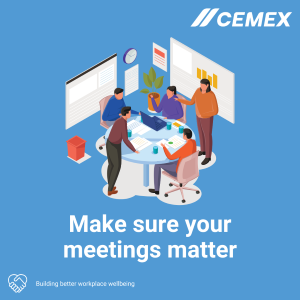Meetings are an unavoidable part of the working day for many of us. And while there are often big benefits to gathering with colleagues to talk over business updates, projects or other activity, too many meetings can lead to feelings of burnout, being overwhelmed or unproductive.
Research shows that two-thirds of workers agree that meetings and calls prevent them from getting their work done, while 64% of people said they found one-on-one conversations more impactful.
So, what can you do to ensure the meetings you organise and attend have a positive outcome?
When organising a meeting:
- Look at who you are inviting. Do they all need to be there? Could some of the invitees be optional, or updated afterwards?
- When are you holding the meeting? Wherever possible, meetings should be held during work hours.
- What are you going to discuss? A clear agenda is important, as well as objectives for the meeting – what do you want to achieve?
- Ask yourself, why are we having this meeting? Is it necessary, or could the time be better used elsewhere?
- Where are you holding the meeting? Does it have to be face to face, or will a Teams call suffice?
- How will activity progress following the meeting – what are next steps and actions for attendees?
Be considerate of attendees’ time – if they don’t need to be in the whole meeting, let them leave early or join late. Be sure to add in time for breaks in longer meetings.
If you are an attendee:
- Don’t be late – this holds everyone up and could mean the meeting overruns.
- Be prepared. Look at the agenda in advance, and make sure you have prepared anything you need to discuss or present.
- Focus on the meeting – put your phone on silent, and don’t look at your emails!
- Don’t interrupt when others are talking. There should be time for everyone to voice their opinion.
For more tips, visit:
